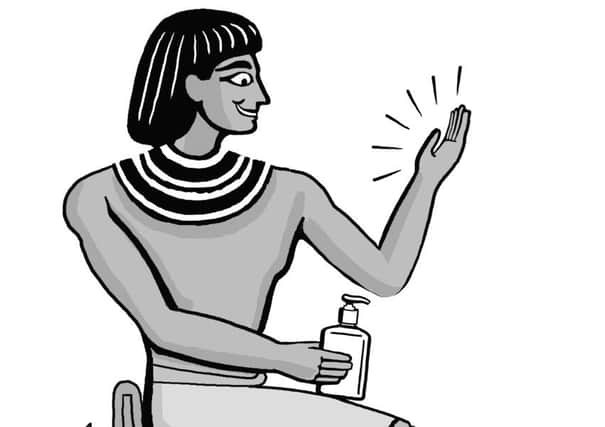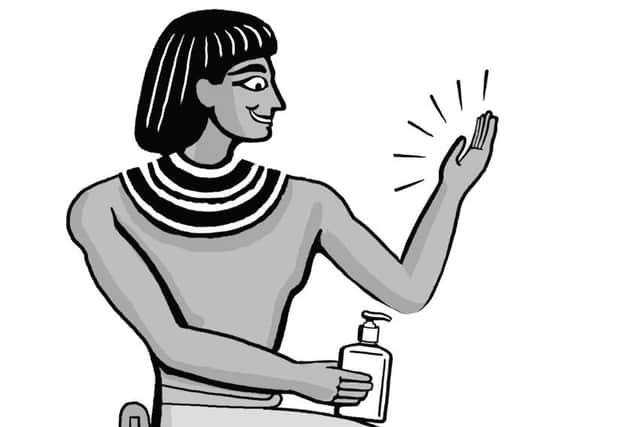44 Scotland Street: Hand sanitiser issues


That was just the sort of thing to engage the attention of a fourteen-year-old boy with a budding interest in science – of course it was asking for trouble to open something that had been sealed for so many years. What could one expect? It was not a question of curses or anything of that sort, it was more an issue of bacteria and viruses. Micro-organisms could lie dormant indefinitely until somebody came along and kicked up the dust, metaphorical and real, under which they had been concealed.
He half-turned to Elspeth. “Do you remember those stories of the Egyptian tombs? Lord Carnarvon and his team? How they all died after they’d opened the tombs? Probably pathogens inside. Rare moulds and so on.”
Advertisement
Hide Ad“Oh nonsense!” said Elspeth. “They were probably much safer inside the tomb than outside, given sanitary conditions in Egypt at the time. And even these days you have to be careful. Everybody who goes for a cruise on the Nile gets the most awful tummy upsets. They just do. It’s the water. Morag McAndrew was really ill after she went on that boat on the Nile. She said the boat itself was very clean but she saw the galley staff washing the plates in the actual Nile. They had a big basket and they put all the plates in it apparently and then lowered it into the Nile and shoogled it around for a while.”


Matthew bit his lip. “Have you got any hand sanitiser?”
“Hand sanitiser!” exclaimed Elspeth. “Really, Matthew, you mustn’t get caught up in all that. Those people who carry those little bottles of gel and keep rubbing it on their hands … Really!”
Matthew bit his lip again. He had developed the habit of taking hand sanitiser with him to work, and he used it several times a day; certainly after handling the door in the small staff washroom that led off his office at the gallery. Recently he had also resorted to opening and closing that door with a handkerchief – a precaution that he also used when he went for coffee at Big Lou’s café, where the handle of the main door must be, he thought, a major vector of transmission of every sore throat and chest infection in the New Town.
And what was wrong with being careful? It was all very well for Elspeth to imply that hand sanitiser was a step too far, but why subject oneself to more germs than necessary? It was not as if he had taken to wearing those face-masks that you see people in Japan wearing as a matter of course. Indeed, he had seen a group of young Japanese tourists in Edinburgh recently and several of them had been wearing white face-masks. Not only was that absurd, it was, he thought, insulting. And where would it end: would people start walking about in those clumsy white suits with portable piped air supplies? Would we go to dinner at friends’ houses wearing protective clothing, and say Nothing personal, of course?
No, all that was a good mile away from the sensible precaution of using hand sanitiser when opening certain doors or when entering concealed rooms …
It was unfair of Elspeth to criticize him for carrying hand sanitiser. He had seen her use it herself, and he also remembered how careful she had been in the days when she had still been teaching. He remembered her exact words.
Advertisement
Hide Ad“Children,” she said, “are walking reservoirs of infection. They get everything and they pass it on really efficiently. And you should smell their hands! They look very cute but smell their hands! Disgusting!” She had gone on to tell him how she had always carried a packet of wet wipes with which she would discreetly wipe the hands and faces of the smellier children and then give them a quick spray from a small bottle of personal freshener that she kept with the wet wipes. She did all that – quite sensibly – and yet she laughed at his carrying his hand sanitiser.
“So you haven’t got any?”
Elspeth sounded short. “Of course I haven’t. And look, we’re going into a concealed room and you’re going on about hand sanitiser!”
Advertisement
Hide Ad“Sorry,” said Matthew. “It’s just that I suddenly remembered those archaeologists and I thought …”
“Matthew!”
“All right, all right.”
They went into the room, the beam of the torch moving quickly round its confines.
“It’s a storeroom,” said Elspeth. “That’s all it is.”
Matthew sounded disappointed. “I’d rather hoped …” He was not sure what he had hoped. Certainly he would have preferred something different and not these stacks of ordinary household articles, exactly the sort of thing that one would expect to find in a typical attic.
There was a child’s toy pram. There was a rolled up rug, tied with white string. There were several dining-room chairs, stacked one upon another. There was an old leather suitcase on which the labels of shipping companies had been stuck and then inexpertly peeled off. There was a typewriter – one of those old uprights that weighed so much they were almost impossible to lift. There was a canvas stretcher bed, half folded, its criss-cross legs an example of the intricate over-engineering of the time.
And then Matthew saw the pictures. “May I have the torch?”
Elspeth passed it to him. “That typewriter …”
“No, it’s not that. It’s the pictures. Look, over there.”
They were stacked against the far wall, four of them, a cloth of some sort draped over their top, as if to conceal them. But their shape revealed what lay beneath.
Mathew negotiated his way between the stretcher bed and the suitcase and stood before the pictures. Slowly and somewhat gingerly he took off the dusty cloth and laid it to one side. Then he bent down to look at the first of the pictures.
Elspeth joined him.
Advertisement
Hide Ad“What are they?” she asked. “The glass on that one looks broken.”
“Just cracked,” said Matthew.
He handed the torch back to Elspeth while he lifted up the painting. “Just shine it on the middle bit there. That’s it.”
He drew in his breath.
“What?” asked Elspeth.
He did not answer, and so she said, “What?” again.
But he did not answer. He was rapt.